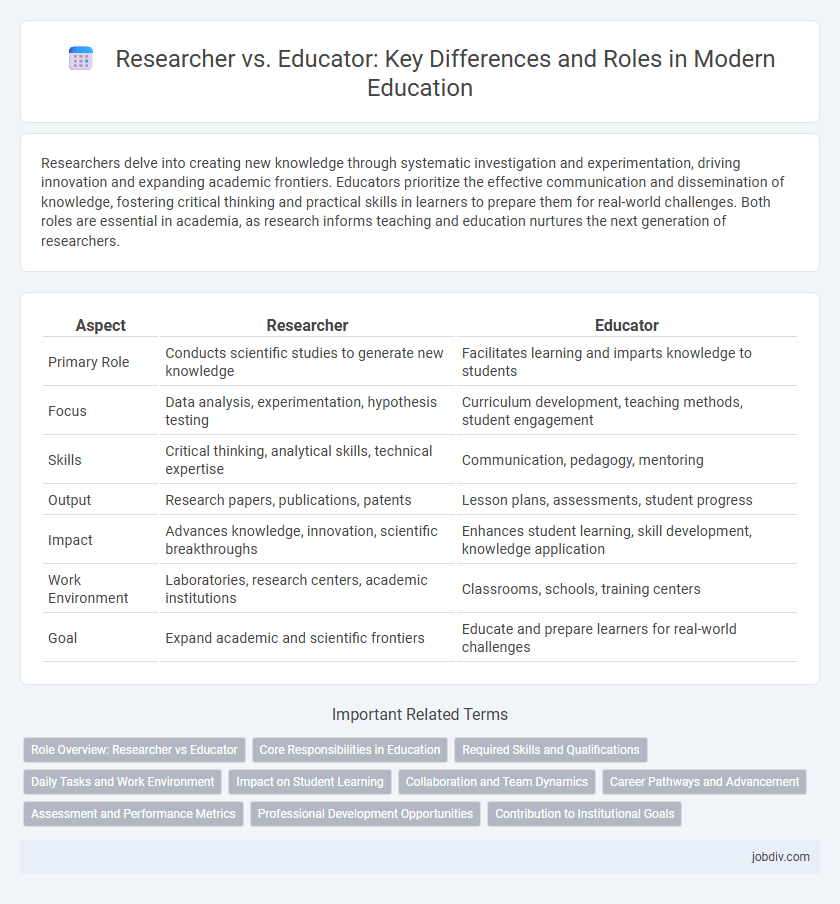Researchers delve into creating new knowledge through systematic investigation and experimentation, driving innovation and expanding academic frontiers. Educators prioritize the effective communication and dissemination of knowledge, fostering critical thinking and practical skills in learners to prepare them for real-world challenges. Both roles are essential in academia, as research informs teaching and education nurtures the next generation of researchers.
Table of Comparison
| Aspect | Researcher | Educator |
|---|---|---|
| Primary Role | Conducts scientific studies to generate new knowledge | Facilitates learning and imparts knowledge to students |
| Focus | Data analysis, experimentation, hypothesis testing | Curriculum development, teaching methods, student engagement |
| Skills | Critical thinking, analytical skills, technical expertise | Communication, pedagogy, mentoring |
| Output | Research papers, publications, patents | Lesson plans, assessments, student progress |
| Impact | Advances knowledge, innovation, scientific breakthroughs | Enhances student learning, skill development, knowledge application |
| Work Environment | Laboratories, research centers, academic institutions | Classrooms, schools, training centers |
| Goal | Expand academic and scientific frontiers | Educate and prepare learners for real-world challenges |
Role Overview: Researcher vs Educator
Researchers primarily generate new knowledge through systematic investigation and analysis, driving innovation and contributing to academic and scientific advancement. Educators focus on imparting existing knowledge, fostering critical thinking, and facilitating student learning through curriculum development and effective teaching strategies. Both roles require specialized expertise but differ in objectives, with researchers emphasizing discovery and educators concentrating on knowledge dissemination.
Core Responsibilities in Education
Researchers focus on generating new knowledge through systematic investigation and data analysis, contributing to academic advancements and evidence-based practices. Educators prioritize delivering instructional content, fostering critical thinking, and facilitating student learning through curriculum design and assessment. Both roles are essential in education, with researchers providing theoretical foundations and educators applying these insights to enhance teaching outcomes.
Required Skills and Qualifications
Researchers require strong analytical skills, proficiency in research methodologies, and advanced degrees such as a PhD in their specialized field to design and conduct experiments or studies. Educators need excellent communication skills, classroom management abilities, and typically hold teaching credentials or certifications along with degrees in education or their subject area. Both roles benefit from continuous professional development, but researchers emphasize technical expertise while educators focus on pedagogical strategies.
Daily Tasks and Work Environment
Researchers primarily spend their days conducting experiments, analyzing data, and writing scholarly articles, often working in laboratories or academic offices that are equipped with specialized tools and technology. Educators focus on lesson planning, delivering lectures, and assessing student performance, typically operating within classrooms or virtual learning environments designed to facilitate interaction. Both roles demand strong communication skills but differ significantly in their routine activities and settings, with researchers emphasizing discovery and innovation, while educators prioritize knowledge dissemination and student engagement.
Impact on Student Learning
Researchers contribute to student learning by integrating cutting-edge knowledge and promoting critical thinking through evidence-based practices. Educators focus on delivering curriculum effectively, fostering engagement, and adapting teaching methods to meet diverse learner needs. Both roles complement each other by enhancing educational outcomes through innovation and personalized instruction.
Collaboration and Team Dynamics
Collaboration between researchers and educators fosters innovative teaching approaches and enriches curriculum development by integrating cutting-edge discoveries with practical classroom applications. Effective team dynamics rely on clear communication, mutual respect for expertise, and shared goals to balance research rigor with educational impact. Strengthening these partnerships enhances knowledge transfer, promotes interdisciplinary learning, and drives continuous improvement in both research and pedagogy.
Career Pathways and Advancement
Researcher career pathways commonly involve securing grants, publishing in peer-reviewed journals, and contributing to academic conferences, which directly influence opportunities for tenure and leadership roles in universities. Educators focus on curriculum development, teaching excellence, and student mentorship, with advancement often measured by teaching awards, administrative positions, and program innovation. Both paths offer distinct advancement trajectories, with researchers emphasizing specialized knowledge production and educators prioritizing pedagogical impact and student success.
Assessment and Performance Metrics
Researchers prioritize quantitative data and experimental designs to evaluate hypotheses, often using peer-reviewed publications and citation indices as performance metrics. Educators emphasize formative and summative assessments to gauge student understanding, relying on grade distributions, student feedback, and mastery of learning objectives as key indicators of teaching effectiveness. Both roles utilize distinct assessment methodologies tailored to their goals, highlighting the divergence in measuring success between research output and educational impact.
Professional Development Opportunities
Researchers benefit from professional development opportunities that emphasize advanced methodologies, grant writing, and publication strategies to enhance their scholarly output. Educators engage in workshops, instructional coaching, and curriculum design training aimed at improving classroom management and student engagement. Both roles require tailored development programs that address their specific professional growth needs to maintain effectiveness and innovation in their fields.
Contribution to Institutional Goals
Researchers advance institutional goals by generating innovative knowledge and securing competitive grants that elevate academic prestige and funding. Educators drive these goals through curriculum development, student mentorship, and fostering critical thinking skills that prepare graduates for professional success. Both roles synergistically enhance the institution's reputation, student outcomes, and overall academic excellence.
Researcher vs Educator Infographic

 jobdiv.com
jobdiv.com